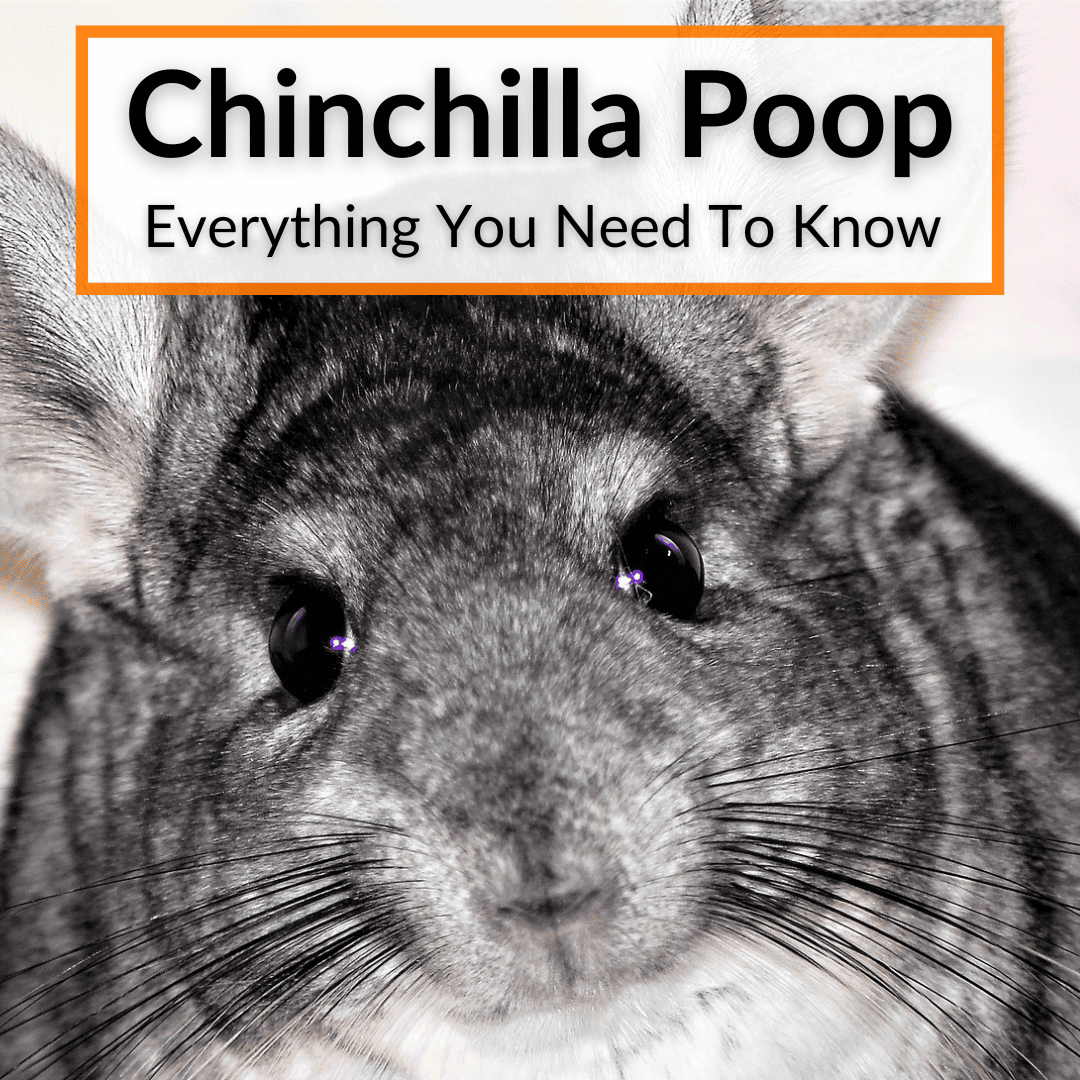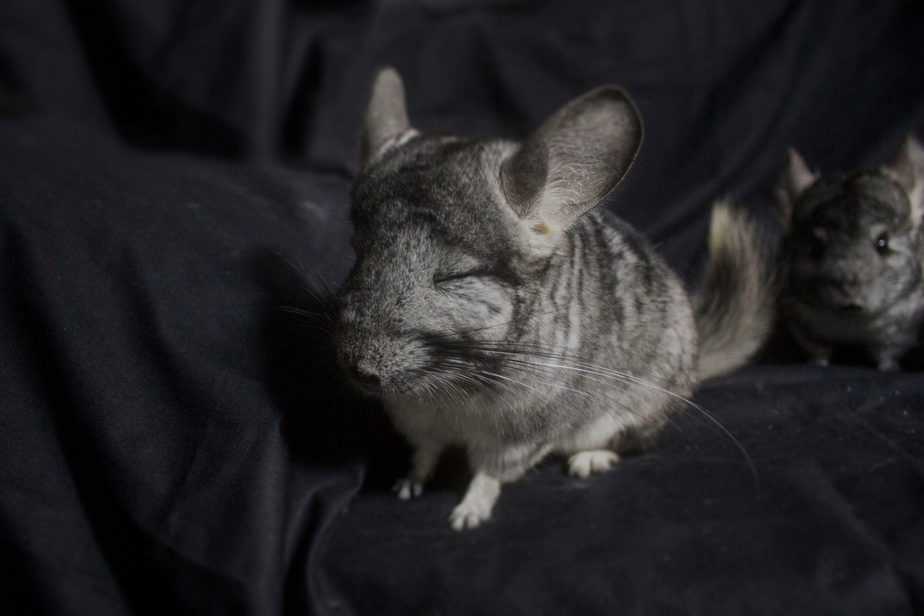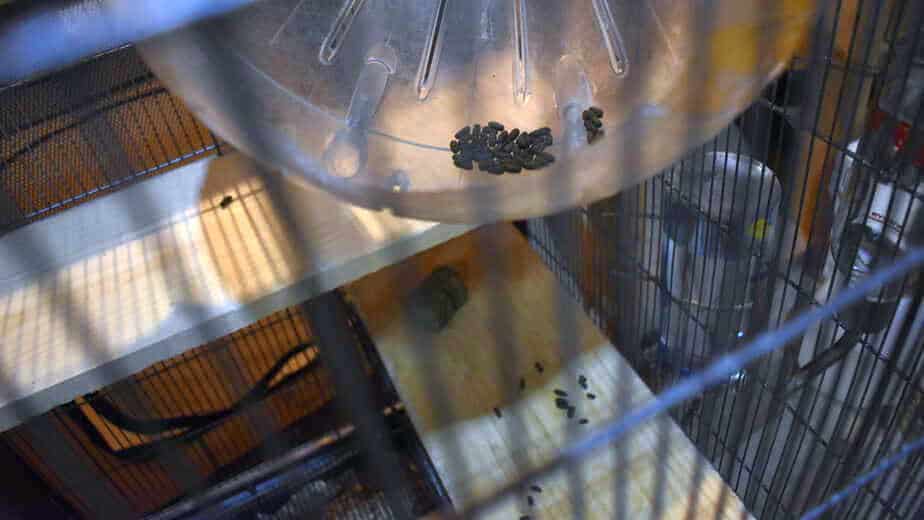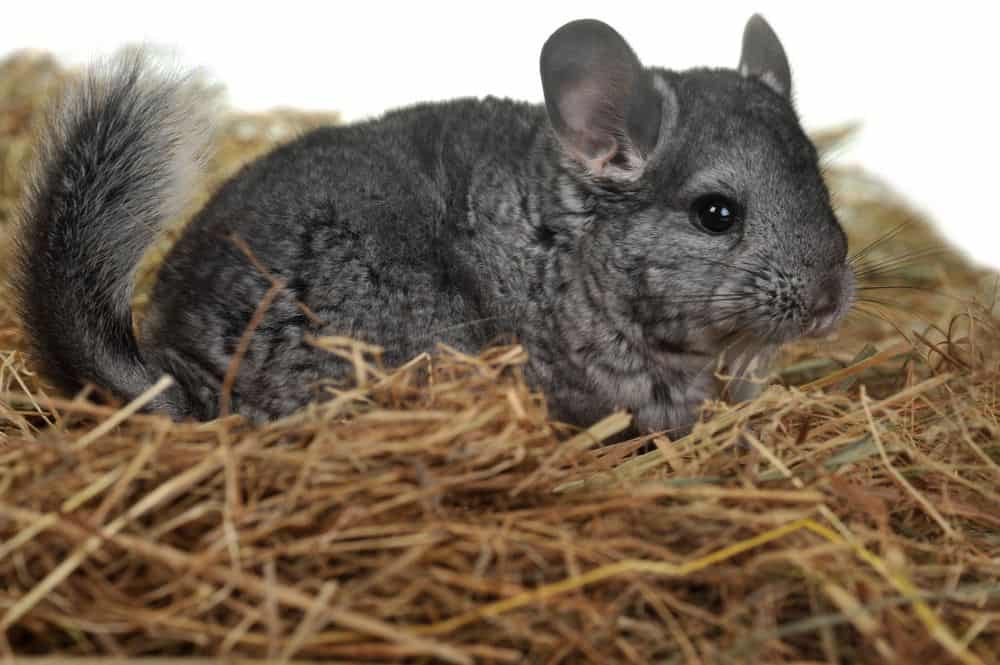
But it is an important one.
Changes in chinchilla droppings are often the best indicator that your pet is suffering from an illness.
That means you first need to know what healthy chinchilla feces looks like.
Only then will you be able to pick up on changes in your chinchilla’s stool.
So what does chinchilla poop look like when it is healthy?
Keep reading to find out. We will cover healthy chinchilla droppings, as well as common changes and what they mean. Plus everything else you need to know about your chinchilla’s poop.
Contents
What Does Chinchilla Poop Look Like?
Chinchilla poop looks like rounded, cylindrical pellets that are dark green, brown, or black in color. The pellets should be firm and dry.
You should always keep an eye on your chinchilla’s poop, because any changes can indicate health problems.
If you find your chinchilla’s poop is wet, soft, runny, sticking to things in its cage, or flattening quickly when your chin steps on it, then there may be something off with your pet’s health. You must never ignore diarrhea in chinchillas. It can quickly turn life-threatening.
Let’s take a closer look at the characteristics of healthy chinchilla poop. After that, we will get into some of the common changes you might see in chinchilla feces and what they could indicate.
Characteristics Of Normal Chinchilla Poop

Your chinchilla’s poop should have the following characteristics:
- General characteristics: A healthy chinchilla produces rounded, compact, small, firm, and dry poop pellets.
- Color: The color of a healthy chinchilla’s poop is either dark green, brown, or black.
- Odor: A healthy chinchilla produces odorless poop pellets.
- Size: Since chinchillas are small animals with small intestines, the poop they produce should also be small. It is important to note the size of your chinchilla’s poop. This will help you know if your animal is healthy. Always watch out for poop size changes when you change your chinchilla’s feed.
- Texture: In the wild, chinchillas drink very little water, since they are native to areas with arid climates. This results in dry and firm poop. Soft, sticky, or runny poop is not normal in chinchillas and can indicate health issues.
- Shape: Chinchilla poop pellets are cylindrical and have rounded ends.
- The number of bowel movements: healthy chinchillas poop 50 to 300 times a day. You will see poop droppings everywhere in its cage. Keep an eye on your chinchilla’s poop quantity. If your pet is producing very little poop, it may be having digestive issues.
Common Issues With Chinchilla Droppings And What They Indicate
Now that you know what chinchilla poop looks like, here are some abnormalities to watch out for.
Soft Poop Or Diarrhea
If your chinchilla is producing soft, sticky, or runny feces, please ask yourself the following questions:
- Have you recently changed your chinchilla’s diet?
- Have you been feeding it too many treats?
- Is your chinchilla showing other symptoms of sickness like appetite changes, lethargy, hiding, etc.?
If your pet’s bowel movements continue to be soft and runny, please see your vet. Your vet might order some tests, including fecal tests, to test for bacterial infection. In rare cases, your chinchilla might have a water-borne parasite that is causing the poop changes.
Worry not. Once your vet diagnoses the cause, your chinchilla should bounce back to normal with the right medicine and dietary changes. Please do not ignore it, if your chinchilla has diarrhea, because it can quickly turn life-threatening.
Mucus In Droppings
Sticky, slimy, mucus-covered droppings in chinchillas could indicate a diet rich in fiber, a lack of healthy bacteria or probiotics in the gut flora, too much water intake, or even a bacterial infection.
Stress can also cause poop changes in chinchillas. If your chinchilla’s droppings continue to be covered in slimy mucus, please have a vet examine your pet.
No Poop Or Constipation

If your chinchilla is not pooping at all, it could indicate severe constipation, an intestinal blockage, or a condition called ileus or gastrointestinal stasis in chinchillas. Your chinchilla might refuse food and hide, if it has blocked intestines and is unable to poop.
It might even show signs of abdominal pain and restlessness. Please see your vet right away if you notice these signs. Your vet might administer some medicine, mineral oil, or an enema to help your pet defecate. Chinchilla constipation can become deadly.
Chinchilla Feces Bacteria And Its Effect On Humans
Sick chinchilla poop could contain different types of bacteria, mainly giardia and salmonella. These bacteria can be harmful to humans and other pets.
Chinchillas can pass zoonotic diseases, such as giardiasis or salmonella poisoning, through their runny poop to humans and other domestic animals.
According to the CDC, symptoms of giardiasis in humans and dogs or cats include:
- Runny, loose stools
- High fever
- Itchy skin
- Swollen joints
- Lack of appetite
- Weight loss
Some animals and humans often show no symptoms of giardiasis at all.
Healthy chinchilla droppings are non-toxic and won’t harm you or your pets. Chinchillas mainly eat grass, hay, small quantities of fruit and vegetables, and commercial pellets made from timothy grass, orchard grass, or alfalfa grass.
These foods produce poop pellets that are easy to clean, odorless, and safe for humans and other pets.
However, if your chinchilla is sick and has chronic diarrhea or runny feces, please keep your dog or cat away from it. Always wash your hands thoroughly after cleaning your pet’s cage. Make sure you have your vet examine your chin’s stool to rule out health issues.
Chinchilla Droppings: Additional Questions

Next, we will answer some common questions related to chinchilla feces. If you have any additional questions, please feel free to ask them in the comments below.
Is Chinchilla Poop A Good Fertilizer?
Since your chinchilla poops all day, the question foremost on your mind might be, “Can I use chinchilla poop as fertilizer?” The answer is yes.
You can use healthy chinchilla poop in your garden mulch for fertilizing your plants. Just like you can compost guinea pig and rabbit droppings, you can also compost your chinchilla’s droppings.
The best part is that cleaning and collecting chinchilla poop is easy, since it has no smell. Healthy chinchilla poop is dry and firm, so there is no sticky mess to deal with either.
Never use a sick chinchilla’s poop for composting. It could contain bacteria or parasites that could harm you and your other pets. Similarly, avoid using chinchilla poop in the compost pile, if your pet is on medication.
Along with healthy chinchilla poop, you can also compost its bedding, hay, hair, and straw. Do not compost chinchilla urine, since that contains acid, which can upset the pH of the compost.
Do Chinchillas Practice Coprophagia?
Yes, chinchillas eat their own poop, a phenomenon known as coprophagia or coprophagy. It might be disgusting to us humans, but coprophagy, or eating their own poop, helps chinchillas regain nutrients lost during excretion.
The act of coprophagy is completely normal in the chinchilla species and is also seen in other small animals like rabbits, mice, guinea pigs, etc.
In the wild, coprophagia helps chinchillas keep their burrows clean. It also helps them regain their lost nutrition, especially when food is scarce. It even regulates their gut flora and reintroduces healthy bacteria in the intestines.
Does Chinchilla Poop Smell?
A healthy chinchilla produces odorless poop. Since chinchillas only eat pellets, grass, hay, fruits, and vegetables, their poop does not smell like cat or dog poop does.
How Many Times A Day Do Chinchillas Poop?
Chinchillas have frequent bowel movements, since they constantly chew on grass or hay. Healthy chinchillas produce between 50 and 300 poop pellets per day. They poop so much that it can be hard to keep the chinchilla droppings in the cage. It doesn’t help that they sometimes toss it out themselves!
Do Chinchillas Have Diarrhea?

Healthy chinchillas don’t have diarrhea. They produce dry, firm poop pellets. If your chinchilla has diarrhea or runny, watery stools lasting for several days, please see your vet right away, as it can quickly turn life-threatening.
Chinchilla Poop: Final Thoughts
The first thing to know about chinchilla poop is that there is going to be a lot of it. These little rodents are poop machines. Luckily, their poop is hard and dry and it does not smell. That makes it easy to clean and much less of a nuisance than the poop of many other common pets.
But that is only if your chinchilla is healthy. If you notice changes in the poop, be it runny droppings or a change in the frequency of defecation, this usually indicates a health issue. If you can’t figure out what is wrong, take your pet to the vet to be safe.
Leave a Reply